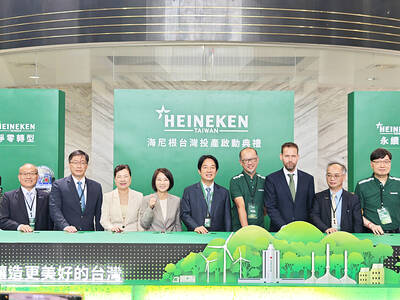Nearly 50 percent of Taiwanese firms surveyed plan to raise employee wages in the second half of this year as business sentiment improves, online job bank yes123 (yes123人力銀行) said last week.
Forty-nine percent of companies are considering raising wages, up from 44.8 percent in a similar poll last year to a four-year high, the job bank said in a survey released on Wednesday last week.
It was also up from 18.5 percent in a similar survey conducted in 2021.

Photo courtesy of the New Taipei City Labor Affairs Department
The job bank attributed the increase to new product launches by global tech companies that could benefit Taiwanese firms in their global supply chains.
Meanwhile, about 39 percent of companies said they are planning to issue bonuses in the second half, up from 36.3 percent in a similar poll last year and compared with 25.3 percent in the 2021 poll, the job bank said.
The results of the survey, conducted from May 25 to June 8, reflect improved sentiment among companies, as 35.1 percent of the respondents expressed optimism about the economy in the third quarter, outnumbering the 15 percent with negative views, the report said, while 49.9 percent held neutral outlooks.
“The nation’s economic downturn is nearing its bottom and the economy would start to come out of the woods next quarter,” yes123 spokesman Bingo Yang (楊宗斌) said.
A global recovery would brighten wage prospects and improve the domestic economy, if hospitality and tourism sectors can resolve their labor shortages, he said.
Taiwan’s GDP contracted 2.87 percent in the first quarter from a year earlier and the economy might register small growth from the second quarter onward, with full-year growth estimated to be 2.04 percent this year, the Directorate-General of Budget, Accounting and Statistics said last month.
The survey found that employees are less optimistic about the economy, as 57.8 percent hold neutral views, 22.1 percent expect things to improve and the remaining 20.1 percent are looking at worsening conditions.
The survey also found that 92.4 percent of firms plan to start hiring campaigns in the third quarter, up from 91.2 percent in the second quarter, with the hospitality, leisure and tourism industry showing the most interest in recruitment.
Companies in the retail, wholesale and trading businesses, as well as in transportation, warehousing, information technology, finance and insurance, also showed strong interest in hiring next quarter due to labor shortages, it said.

purpose: Tesla’s CEO sought to meet senior Chinese officials to discuss the rollout of its ‘full self-driving’ software in China and approval to transfer data they had collected Tesla Inc CEO Elon Musk arrived in Beijing yesterday on an unannounced visit, where he is expected to meet senior officials to discuss the rollout of "full self-driving" (FSD) software and permission to transfer data overseas, according to a person with knowledge of the matter. Chinese state media reported that he met Premier Li Qiang (李強) in Beijing, during which Li told Musk that Tesla's development in China could be regarded as a successful example of US-China economic and trade cooperation. Musk confirmed his meeting with the premier yesterday with a post on social media platform X. "Honored to meet with Premier Li

Dutch brewing company Heineken NV on Friday announced an investment of NT$13.5 billion (US$414.62 million) over the next five years in Taiwan. The first multinational brewing company to operate in Taiwan, Heineken made the statement at a ceremony held at its brewery in Pingtung County. It also outlined its efforts to make the brewery “net zero” by 2030. Heineken has been in the Taiwanese market for 20 years, Heineken Taiwan managing director Jeff Wu (吳建甫) said. With strong support from local consumers, the Dutch brewery decided to transition from sales to manufacturing in the country, Wu said. Heineken assumed majority ownership and management rights

coverage expansion: The industrial PC maker has proposed to acquire 3.938 million Aures shares to strengthen its global smart retail presence Leading industrial PC maker Advantech Co (研華) plans to acquire Aures Technologies SA, a French company known for its point-of-sale (POS) and kiosk equipment, to expand its global coverage in smart retail products and services. Advantech proposed to acquire 3.938 million Aures shares from the French firm’s major shareholder and through a public tender offer at up to 6.7 euros per share, the PC maker said in a statement after announcing the deal at the Taiwan Stock Exchange late on Friday. The company aims to acquire up to 100 percent equity of Aures, a well-known brand in the western market with a

Microsoft Corp yesterday said that it would create Thailand’s first data center region to boost cloud and artificial intelligence (AI) infrastructure, promising AI training to more than 100,000 people to develop tech. Bangkok is a key economic player in Southeast Asia, but it has lagged behind Indonesia and Singapore when it comes to the tech industry. Thailand has an “incredible opportunity to build a digital-first, AI-powered future,” Microsoft chairman and chief executive officer Satya Nadella said at an event in Bangkok. Data center regions are physical locations that store computing infrastructure, allowing secure and reliable access to cloud platforms. The global embrace of AI